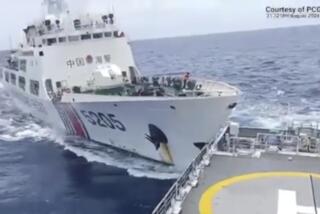Wider U.S. Military Role in Gulf Studied : Admiral Reportedly Seeks More Authority to Hit Iranian Boats
- Share via
DUBAI, United Arab Emirates — The U.S. military command in the Persian Gulf is seeking approval from Washington to attack any Iranian gunboat firing on merchant vessels that then call for assistance, regardless of their national flag, according to Western sources.
The request for greater military latitude to strike Iranian forces originated, the sources said, with Rear Adm. Harold J. Bernsen, commander of the Middle East Force that has responsibility for protecting U.S.-flag ships in the waterway.
The sources said the Reagan Administration is considering a broader role for the U.S. forces, allowing them to confront Iranian gunboats when they are detected stalking civilian oil tankers.
Such a move would effectively strip away the last vestige of U.S. neutrality in the seven-year-old Iran-Iraq War and would put U.S. forces in this troubled region on a virtual war footing with Iran.
U.S. helicopters attacked three Iranian gunboats last week but only after the Iranians reportedly fired machine guns in their direction. One Western military analyst pointed out that without this provocation, U.S. forces would have been powerless to intercede if the Iranian gunboats had gone on that night to attack non-U.S. merchant shipping.
Up to now, the Reagan Administration has narrowly defined the U.S. military mission in the gulf to escorting U.S. flag vessels, most prominently the 11 Kuwaiti tankers that were re-registered as U.S. ships.
This policy has allowed the United States to maintain official neutrality in the Iran-Iraq War.
But while the American buildup in the gulf was conducted in the name of protecting free navigation at sea, U.S. policy is now seen to be compromising that principle by tolerating Iraqi attacks on foreign tankers carrying Iranian crude yet seeking to thwart any Iranian retaliatory action against vessels transporting oil from Iraq’s Arab allies.
One U.S. official said that if a U.S. warship were standing a mile away from an Iranian assault on a Pakistani tanker, “Under current policy we would do nothing. We would be available for rescue of seamen in the water, if it was necessary.”
“The Iranians are beginning to figure out that we will not come to the aid of a (non-U.S. flag) ship,” said a U.S. official in the region.
“We also are beginning to get ships that are tagging on to our convoys, and the question comes up what we do if they attack some ship that is in train with us,” the official said. “That’s not answered, so the Navy needs some guidance in this area, and they’re looking at it.”
More to Read
Sign up for Essential California
The most important California stories and recommendations in your inbox every morning.
You may occasionally receive promotional content from the Los Angeles Times.













